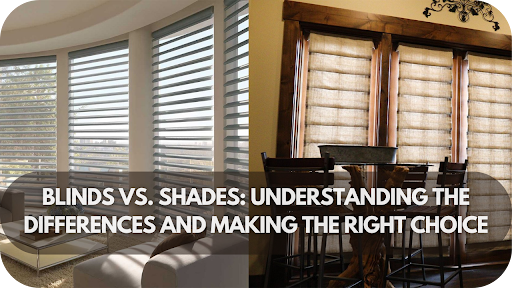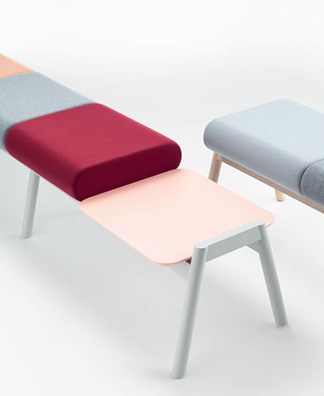Do you need help deciding between blinds and shades for your windows?
With so many options and features, the choice can feel overwhelming. Each type has its benefits and drawbacks, and selecting the wrong one can affect your home’s aesthetics and functionality.
Our guide breaks down the key differences between blinds and shades, helping you understand their unique features and benefits. You can easily find the perfect window covering that matches your style, budget, and practical needs.
What Are Blinds?
Blinds are window treatments made of horizontal or vertical slats that can be tilted, raised, or lowered to control light and privacy. They are known for their durability and versatility and are typically crafted from wood, aluminium, or faux wood.
They allow precise control over the amount of sunlight entering a room, making them ideal for spaces needing flexibility. Could blinds be the perfect blend of style and functionality for your windows?
Advantages of Blinds
Why are blinds such a popular choice for window treatments? Their unique features make them a versatile and functional solution for any home:
- Precise Light Control: With adjustable slats, blinds allow you to control the exact amount of light entering a room, from a soft glow to complete darkness.
- Enhanced Privacy: The tiltable slats provide privacy without blocking natural light, offering a balance of openness and seclusion.
- Durability: Made from wood, aluminium, or faux wood, blinds are robust and long-lasting, even in high-traffic or humid areas.
- Versatile Designs: Available in various styles and finishes, blinds effortlessly complement modern, rustic, or traditional interiors.
- Low Maintenance: Cleaning blinds is simple, as they can be wiped down easily with a cloth, making them ideal for busy households.
What Are Shades?
Shades are a single piece of fabric designed to cover a window, offering a softer, seamless aesthetic compared to blinds.
Available in styles like Roman, roller, and cellular shades, they provide excellent light control and insulation options.
Unlike blinds, shades cannot be tilted but raised or lowered to adjust light levels. With their elegant and functional design, could shades be the key to creating a cosy and energy-efficient space?
Advantages of Shades
Why might shades be the ideal choice for your window treatments? Their unique features offer a perfect blend of style and functionality:
- Elegant Appearance: Shades’ seamless, fabric-based design provides a soft and sophisticated aesthetic, making them versatile for modern and classic interiors.
- Superior Light Diffusion: Unlike blinds, shades gently diffuse light, creating a warm, cosy ambience without harsh shadows or glare.
- Energy Efficiency: Cellular shades, in particular, are designed to trap air within their honeycomb structure, providing excellent insulation to keep your home comfortable while reducing energy costs.
- Customisation Options: Available in various colours, patterns, and opacity levels, shades can be tailored to match any decor and desired light control.
- Enhanced Safety: Cordless and motorised options make shades safer for households with children or pets.
Differences Between Blinds and Shades
When choosing window treatments, understanding the differences between blinds and shades can make all the difference in achieving the perfect balance of style, functionality, and practicality for your space.
Here’s a clear comparison to help you decide which option suits your needs best:
| Feature | Blinds | Shades |
| Material | Typically made from hard materials like wood, aluminium, or faux wood. | Usually crafted from soft fabrics like cotton, polyester, or blends. |
| Light Control | Offer precise light control with adjustable slats that can be tilted to customise brightness. | Provide uniform light diffusion but cannot adjust the level of incoming light. |
| Privacy | Adjustable slats allow for variable privacy levels. | Provide full coverage but no flexibility to adjust privacy without raising or lowering. |
| Durability | Hardier and more resistant to wear, especially in moisture-prone areas like kitchens. | More prone to wear and fading, particularly in humid or sunny environments. |
| Design Variety | Sleek, modern look with a wide range of colours, finishes, and materials. | Soft, elegant aesthetic with various patterns, colours, and textures. |
| Ease of Maintenance | It is easier to clean; slats can be wiped down individually. | It requires more upkeep; fabrics may need professional cleaning or gentle vacuuming. |
| Cost | Often more cost-effective, especially in faux materials. | Typically, it is more expensive due to fabric and customisation options. |
| Best For | Minimalist, modern interiors and spaces require precise light control. | Cosy, traditional spaces or where a soft, fabric-based aesthetic is desired. |
Factors to Consider When Choosing Blinds or Shades
When deciding between blinds and shades, consider crucial factors like light control, privacy, style, and insulation to find the perfect fit for your home’s needs.
- Room Function and Desired Atmosphere: Blinds suit modern living room window treatments with light control, offices for precision, and kitchens for moisture resistance. Shades offer cosy elegance in bedroom window treatments, insulation, and moisture-resistant options for stylish bathroom treatments.
- Light Control Needs: The right window treatment transforms light management: blinds with adjustable slats ensure precision for living rooms or offices. Shades, like cellular or Roman, offer diffused light and insulation, creating a cosy atmosphere but less flexibility than blinds.
- Privacy Requirements: The right window treatment ensures privacy: blinds with adjustable slats offer flexibility, while cellular and roller shades block views effectively. Roman shades add style but may allow light leakage along edges.
- Style and Décor: Blinds and shades enhance décor uniquely. Wood blinds warm rustic spaces, and aluminium blinds add modernity. Roman shades bring elegance, cellular shades suit styles with insulation, and roller shades offer minimalism with custom colours and perfect measurements.
- Budget: Your budget impacts your choice: Vinyl blinds are affordable, aluminium blinds offer durability, and wood blinds reflect premium pricing. Shades range from cost-effective roller shades to pricier Roman and cellular options, with cellular shades providing energy efficiency for potential long-term savings.
- Maintenance: Blinds are low-maintenance; aluminium and vinyl need wiping, while wood requires dusting and refinishing. Roller shades are simple to clean; Roman shades need more care, and cellular shades require occasional vacuuming for dust removal.
- Energy Efficiency: Blinds provide minimal insulation, with wood slightly better than aluminium or vinyl. Shades, especially cellular shades, excel in energy efficiency, while Roman shades offer moderate insulation, and roller shades provide limited thermal benefits.
- Child Safety: Prioritise safety with cordless or motorised window treatments to avoid cord hazards for children. Retrofit existing blinds with safety devices and choose products that meet child safety standards to prevent accidents and ensure peace of mind.
Why Choose Into Blinds for Your Window Treatments?
Why should Into Blinds be your top choice for window treatments? With a vast selection and expert craftsmanship, they provide tailored solutions for every need and style. Their range includes everything from sleek Venetian blinds to luxurious Roman shades, ensuring the perfect match for any interior.
Offering made-to-measure blinds and shades, Into Blinds guarantees a flawless fit for windows of all sizes and shapes.
Known for using high-quality materials and superior finishes, their products are durable and built to last. Their energy-efficient options, such as cellular shades and insulated blinds, help reduce heat loss and cooling costs, improving your home’s comfort.
With exceptional customer support, including consultations and installation, Into Blinds makes upgrading your windows effortless and stress-free.
Conclusion
Selecting between blinds and shades hinges on your light control, privacy, and style needs. Evaluate your preferences and requirements to make an informed choice that enhances both function and aesthetics in your home.
Explore our range of blinds and shades today to find the perfect solution for your Melbourne home.


